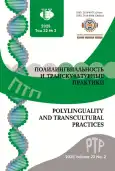Ethnolinguistic Identity of the Sakha-Speaking Evenks: Results of a Study in the Zhigansk District of the Republic of Sakha (Yakutia)
- 作者: Danilov I.A.1
-
隶属关系:
- Institute for Humanities Research and Indigenous Studies of the North of Siberian Branch of the Russian Academy of Sciences
- 期: 卷 22, 编号 2 (2025)
- 页面: 240-250
- 栏目: LANGUAGES IN CONTACT: THEORY AND PRACTICE
- URL: https://journal-vniispk.ru/2618-897X/article/view/326844
- DOI: https://doi.org/10.22363/2618-897X-2025-22-2-240-250
- EDN: https://elibrary.ru/OSNXYK
- ID: 326844
如何引用文章
全文:
详细
The article explores the ethnolinguistic identity of Sakha-speaking Evenks living in the Zhigansky National Evenk District of the Republic of Sakha (Yakutia) in the context of language shift. The study is based on data collected during fieldwork conducted in 2024 in villages with compact Evenk populations. The analysis draws on an ethnosociolinguistic survey ( N = 200) and is supplemented by insights from in-depth interviews. The findings reveal a growing symbolic significance of the Evenk language, particularly among young people, despite their low proficiency. The designation of the district as a national Evenk territory has had a positive impact on language revitalization efforts by promoting education, cultural events, and linguistic landscape initiatives. Modern technologies also play a crucial role by creating new opportunities for learning and using the language. The study concludes that language loss does not necessarily lead to the erosion of ethnic identity; on the contrary, a language may acquire special symbolic power in the process of its decline. However, for the language to function fully, a comprehensive language policy is essential. The experience of Sakha-speaking Evenks demonstrates the potential for revitalizing minority languages even under prolonged linguistic dominance of other languages.
作者简介
Igor Danilov
Institute for Humanities Research and Indigenous Studies of the North of Siberian Branch of the Russian Academy of Sciences
编辑信件的主要联系方式.
Email: igor_danilov_2000@mail.ru
ORCID iD: 0000-0002-1974-3088
SPIN 代码: 3644-6370
Junior Researcher of the Center for Sociolinguistic Studies
1 Petrovskogo St, Yakutsk, 677027, Russian Federation参考
- Khanova, A.F., T.A. Bol’gina, and O.V. Dragoy. 2024[E1]. “Coefficient of emotivity “native language” in the context of measuring the symbolic power of minority languages of the Russian Federation (based on the All-Russian Population Census 2010 and 2020).” Tomsk Journal of Linguistics and Anthropology, no 2(44), pp. 58-69. https://doi.org/10.23951/2307-6119-2024-2-58-69. Print. (In Russ.)
- Vakhtin, N.B. 2001. Languages of the peoples of the North in the 20th century: essays on language shift. St. Petersburg: Dmitriy Bulanin Press. Print. (In Russ.)
- Kazakevich, O.A., E.M. Budyanskaya, A.P. Yevstigneyeva, Yu.B. Koryakov, D.D. Mordashova, S.V. Pokrovskaya, K.K. Polivanov, E.A. Renkovskaya, Z.M. Khalilova, and K.O. Sheyfer, 2022. “Language vitality scales and their applicability to specific language situations.” Topics in the Study of Language, no. 4, pp. 7-47. https://doi.org/10.31857/0373-658X.2022.4.7-47. Print. (In Russ.)
- Koryakov, Yu.B., T.I. Davidyuk, V.S. Kharitonov, A.P. Yevstigneyeva, and A.A. Syuryun. 2023. List of languages of Russia and their vitality statuses. Monografiya-preprint. Institute of Linguistics of the Russian Academy of Sciences Press. Print. (In Russ.)
- Struchkov, K.N. 2018. “Communicative culture of the Evenks of the village of Iengra in modern conditions.” Theoretical and Applied Linguistics, no 4(2), pp. 91-98. https://doi.org/10.22250/ 2410719020184291_98. Print. (In Russ.)
- Ivanashko, Yu.P., O.N. Morozova, N.Ya. Bulatova, and L.N. Maksimova. 2017. “Sociolinguistic situation in the village of Ust-Nyukzha, Tyndinsky district, Amur region.” Theoretical and Applied Linguistics, no. 3(4), pp. 13-33. https://doi.org/10.22250/2410-719020173413_33. Print. (In Russ.)
- Sirina, A.A. 2012. Evenks and Evens in the modern world: self-awareness, nature management, worldview. Moscow: Vostochnaya literature Press. Print. (In Russ.)
- Zhigansk ulus: history, culture, folklore. 2012. Yakutsk: Bichik Press. Print. (In Russ.)
- Ivanova, N.I. 2022. The language situation in the Republic of Sakha (Yakutia): the Sakha language at the beginning of the 21st century, the ethnosociopsycholinguistic aspect. Novosibirsk: Nauka Press. Print. (In Russ.)
- Gabdrakhmanova, G.F., and E. Alos-I-Font. 2024. “On the issue of recording nationality and language proficiency in the All-Russian Population Census 2020-2021.” Sociological Studies, no. 1, pp. 28-39. https://doi.org/10.31857/S0132162524010032. Print. (In Russ.)
- Khilkhanova, E.V., and G.A. Dyrkheyeva. 2024. “Language and ethnic identity in the mirror of population censuses and regional surveys: the case of the Buryat language.” Tomsk Journal of Linguistics and Anthropology, no. 4(46), pp. 112-126. https://doi.org/10.23951/2307-6119-2024-4-112-126. Print. (In Russ.)
- Danilov, I.A., N.E. Zakharova, and A.E. Zakharova. 2024. “The symbolic power of the Evenki language in the context of the stability of the ethnic identity of the Evenks of Yakutia.” New Research of Tuva, no. 4, pp. 348-359. https://doi.org/10.25178/nit.2024.4.22. Print. (In Russ.).
- Bulatova, N.Ya. 2017. “Language processes in the era of social transformations (based on the Evenki language).” Theoretical and Applied Linguistics, no. 3(2), pp. 5-19. https://doi.org/10.22250/2410-7190_2017_3_2_5_19. Print. (In Russ.)
- Ignat’yeva, V.B., O.V. Vasil’yeva, A.G. Tomaska, E.G. Maklashova, Yu.G. Stepanova, and I.A. Danilov. 2022. Identity, language and culture of the youth of the indigenous peoples of the North: Results of research in Yakutia. Novosibirsk: Nauka Press. (In Russ.)
- Danilov, I.A. 2022. “The Evenki language in the village of Syuldyukar, Mirny district, Republic of Sakha (Yakutia): a reverse language shift?” Sociolinguistics, no. 2(10), pp. 174-192. https://doi.org/10.37892/2713-2951-2-10-174-192. Print. (In Russ.)
- Zakharova, A.E., and N.E. Zakharova 2023. “Sociolinguistic situation in a multiethnic region (on the example of the Republic of Sakha (Yakutia)).” Unity and diversity of languages and cultures of the peoples of Russia (on the example of the republics of Bashkortostan, Tatarstan, Sakha (Yakutia), Dagestan, pp. 196-219. Ufa: Ufa Federal Research Centre of the Russian Academy of Sciences Press. Print. (In Russ.)
- Sharina, S.I. 2022. “Minority languages in the Republic of Sakha (Yakutia): features of modern language policy.” Sociolinguistics, no. 2(10), pp. 32-52. https://doi.org/10.37892/2713-2951-2-10-32-52. Print. (In Russ.).
补充文件









